Related Research Articles

Vesta is the virgin goddess of the hearth, home, and family in Roman religion. She was rarely depicted in human form, and was more often represented by the fire of her temple in the Forum Romanum. Entry to her temple was permitted only to her priestesses, the Vestal Virgins, who guarded particular sacred objects within, prepared flour and sacred salt for official sacrifices, and tended Vesta's sacred fire at the temple hearth. Their virginity was thought essential to Rome's survival; if found guilty of inchastity, they were punished by burial alive. As Vesta was considered a guardian of the Roman people, her festival, the Vestalia, was regarded as one of the most important Roman holidays. During the Vestalia privileged matrons walked barefoot through the city to the temple, where they presented food-offerings. Such was Vesta's importance to Roman religion that following the rise of Christianity, hers was one of the last non-Christian cults still active, until it was forcibly disbanded by the Christian emperor Theodosius I in AD 391.
In Greek mythology, Moros /ˈmɔːrɒs/ or Morus /ˈmɔːrəs/ is the 'hateful' personified spirit of impending doom, who drives mortals to their deadly fate. It was also said that Moros gave people the ability to foresee their death. His Roman equivalent was Fatum.
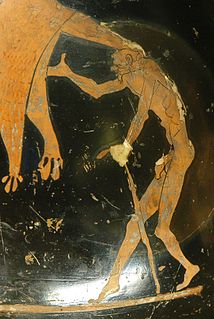
In Greek mythology, Geras, also written Gēras, was the god of old age. He was depicted as a tiny, shriveled old man. Gēras's opposite was Hebe, the goddess of youth. His Roman equivalent was Senectus. He is known primarily from vase depictions that show him with the hero Heracles; the mythic story that inspired these depictions has been lost.
Vejovis or Vejove was a Roman god of Etruscan origins.
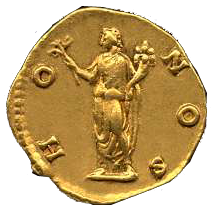
Honos or Honor was the Roman god personifying honor. He was closely associated with Virtus, the goddess of manliness, or bravery, and the two are frequently depicted together. Honos is typically shown wearing a chaplet of bay leaves, while Virtus is identified by her helmet.

Pietas, translated variously as "duty", "religiosity" or "religious behavior", "loyalty", "devotion", or "filial piety", was one of the chief virtues among the ancient Romans. It was the distinguishing virtue of the founding hero Aeneas, who is often given the adjectival epithet pius ("religious") throughout Virgil's epic Aeneid. The sacred nature of pietas was embodied by the divine personification Pietas, a goddess often pictured on Roman coins. The Greek equivalent is eusebeia (εὐσέβεια).

Etruscan religion comprises a set of stories, beliefs, and religious practices of the Etruscan civilization, heavily influenced by the mythology of ancient Greece, and sharing similarities with concurrent Roman mythology and religion. As the Etruscan civilization was gradually assimilated into the Roman Republic from the 4th century BC, the Etruscan religion and mythology were partially incorporated into ancient Roman culture, following the Roman tendency to absorb some of the local gods and customs of conquered lands. The first attestations of an Etruscan religion can be traced back to the Villanovan culture.
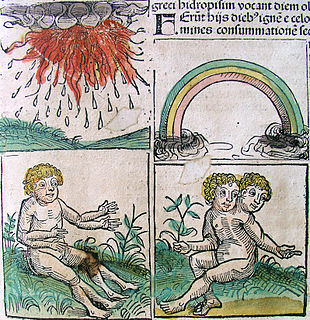
An omen is a phenomenon that is believed to foretell the future, often signifying the advent of change. It was commonly believed in ancient times, and still believed by some today, that omens bring divine messages from the gods.
Cult is the care owed to deities and temples, shrines, or churches. Cult is embodied in ritual and ceremony. Its present or former presence is made concrete in temples, shrines and churches, and cult images, including cult images and votive offerings at votive sites.

Caelus or Coelus was a primal god of the sky in Roman myth and theology, iconography, and literature. The deity's name usually appears in masculine grammatical form when he is conceived of as a male generative force.
Publius Nigidius Figulus was a scholar of the Late Roman Republic and one of the praetors for 58 BC. He was a friend of Cicero, to whom he gave his support at the time of the Catilinarian conspiracy. Nigidius sided with the Optimates in the civil war between Julius Caesar and Pompeius Magnus.
In Greek mythology, Oizys is the goddess of misery, anxiety, grief, depression, and misfortune. Her Roman name is Miseria, from which the English word misery is derived. Oizys is a minor goddess without a great cult following, but a primordial goddess of misery and depression with a certain amount of mythological weight nonetheless.

De Natura Deorum is a philosophical dialogue by Roman Academic Skeptic philosopher Cicero written in 45 BC. It is laid out in three books that discuss the theological views of the Hellenistic philosophies of Epicureanism, Stoicism, and Academic Skepticism.
Charles Duke Yonge was an English historian, classicist and cricketer. He wrote numerous works of modern history, and translated several classical works. His younger brother was George Edward Yonge.
In ancient Rome, res divinae, singular res divina, were the laws that pertained to the religious duties of the state and its officials. Roman law was divided into the res divina and res publica, the divine and public or political spheres, the latter phrase being the origin of the English word "republic." Res divina also means, as a technical term, ritual sacrifice.

The vocabulary of ancient Roman religion was highly specialized. Its study affords important information about the religion, traditions and beliefs of the ancient Romans. This legacy is conspicuous in European cultural history in its influence on later juridical and religious vocabulary in Europe, particularly of the Western Church. This glossary provides explanations of concepts as they were expressed in Latin pertaining to religious practices and beliefs, with links to articles on major topics such as priesthoods, forms of divination, and rituals.
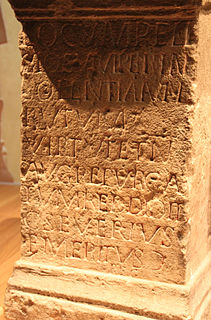
The Latin term religiō, the origin of the modern lexeme religion, is of ultimately obscure etymology. It is recorded beginning in the 1st century BC, i.e. in Classical Latin at the end of the Roman Republic, notably by Cicero, in the sense of "scrupulous or strict observance of the traditional cultus". In classic antiquity, it meant conscientiousness, sense of right, moral obligation, or duty towards anything and was used mostly in secular or mundane contexts.
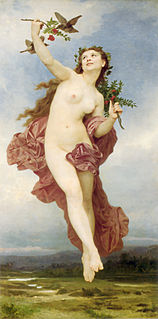
In Roman mythology, Dies was the personification of day. She was the daughter of Chaos and Caligo (Mist), and the counterpart of the Greek goddess Hemera.

In Greek mythology, Asteria or Asterie is a daughter of the Titans Coeus (Polus) and Phoebe and the sister of Leto. According to Hesiod, by the Titan Perses she had a single child, a daughter named Hecate, the goddess of witchcraft. Other authors made Asteria the mother of the fourth Heracles and Hecate by Zeus.
References
- ↑ Oxford Latin Dictionary, "natio, ~onis, f."
- ↑ Cicero, On the Nature of the Gods , 3.47